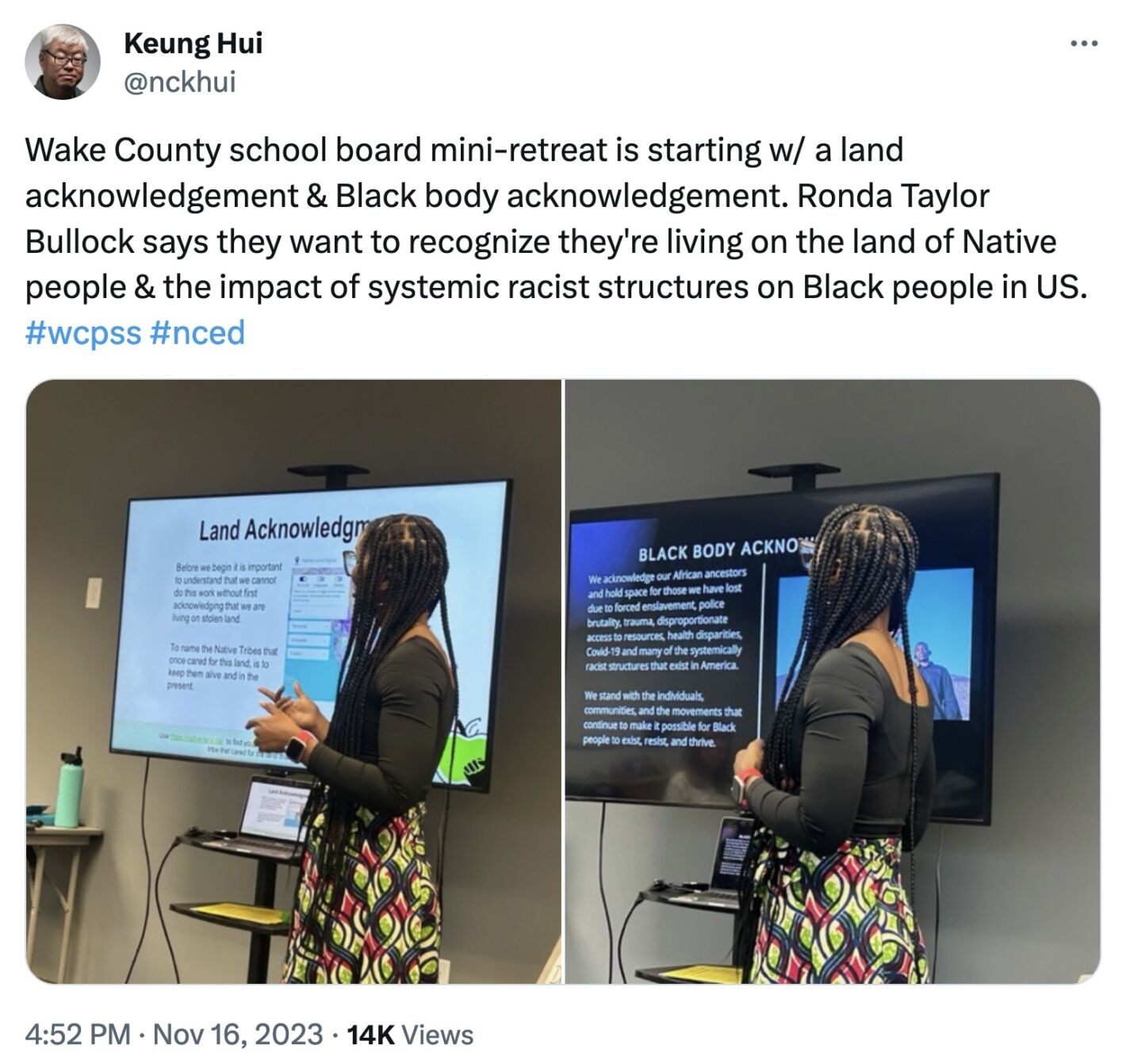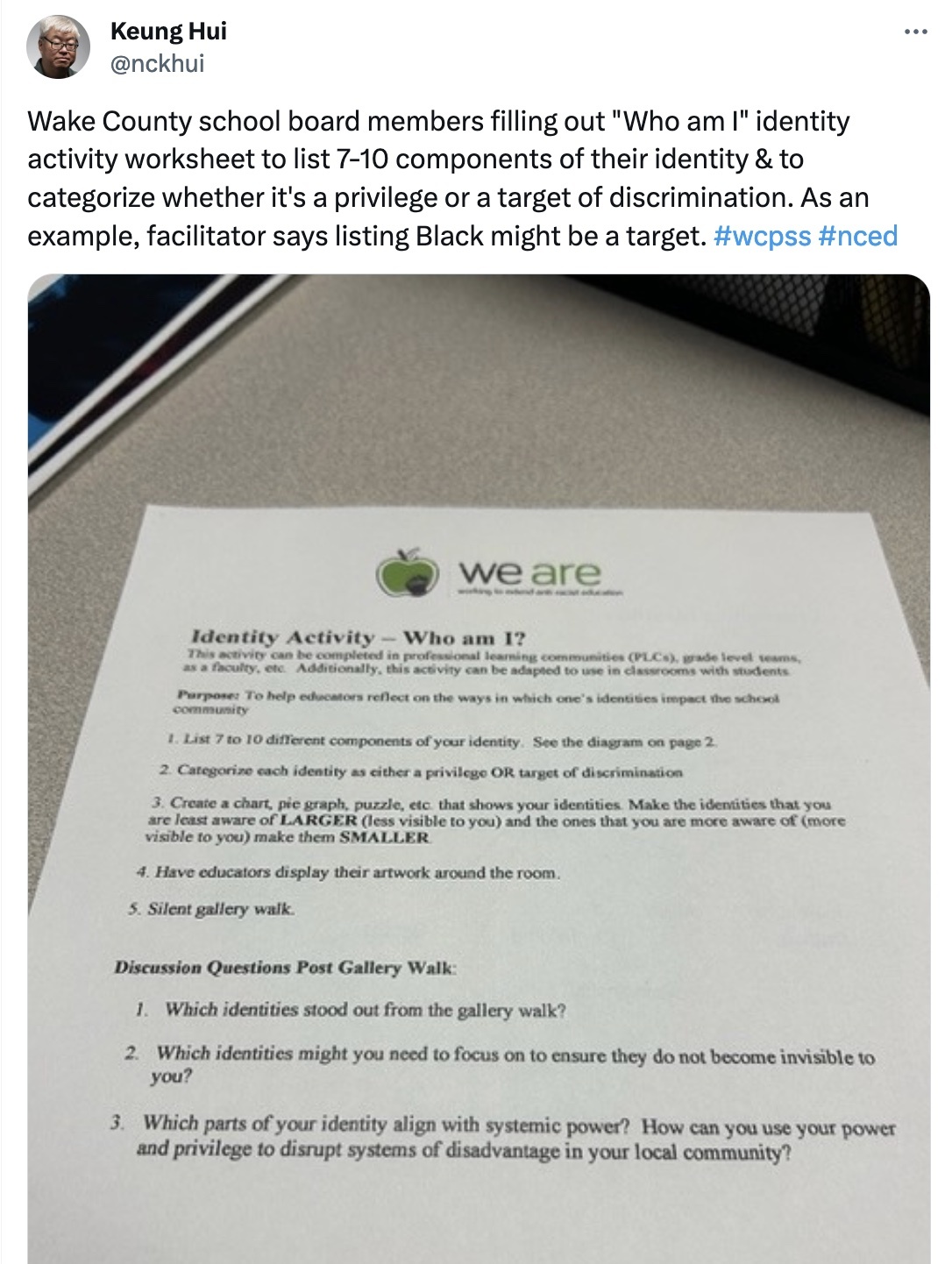- The Wake County Public School System provided training for school board members that included a “land acknowledgment,” a “black body acknowledgment,” a video about confronting one’s “implicit biases,” and an article arguing that such biases cause racial disparities in school discipline
- The training represents only the latest effort to entrench the concept of equity in Wake County schools
- The Carolinas Academic Leadership Network (CALN) offers alternative professional development opportunities and resources to school board members who want to promote academic excellence and parental involvement throughout their school districts
On Nov. 16, the Wake County Public School System (WCPSS) provided “implicit bias” training for its board members, showing the district remains in the grip of social justice ideology and thereby highlighting the need for alternative professional development opportunities for school board members.
The training, which reportedly cost more than $3,000, was conducted by a member of a group called “we are” whose research centers on “critical race theory, whiteness studies, white children’s racial identity construction, and anti-racism.”
Though “equity” sounds like “equality,” the two aren’t synonymous. “Equality” means treating all people equally, while “equity” refers to attempts at making everyone have the same outcomes, even if it requires giving some people preferential treatment and discriminating against others.
The session opened with a “land acknowledgement,” which claimed that equity work could not proceed “without first acknowledging that we are living on stolen land.” Then followed a “black body acknowledgment” that asked attendees to acknowledge the “systemically racist structures that exist in America.”

Source: News & Observer K-12 education reporter Keung Hui on “X” (formerly Twitter).
Board members were also tasked with evaluating aspects of their identities and considering whether each of those traits constituted a “privilege” or a “target of discrimination.”

Source: News & Observer K-12 education reporter Keung Hui on “X” (formerly Twitter).
Other components of the training included watching a short video about confronting one’s “implicit biases” and discussing an article arguing that such biases cause racial disparities in school discipline.
Six WCPSS board members — Monika Johnson-Hostler, Lindsay Mahaffey, Chris Heagarty, Tara Waters, Sam Hershey, and Tyler Swanson — attended the training. Cheryl Caulfield, Wing Ng, and Lynn Edmonds didn’t attend.
WCPSS’s Commitment to Equity and Other Tenets of “Social Justice”
The recent training offered to WCPSS board members is part of the district’s efforts to carry out its equity policy, adopted in November 2022.
Will Chavis, the district’s assistant superintendent for equity affairs, announced in April that the district would take steps to implement the equity policy (Policy 1150), which permits the redistribution of resources in the service of equal outcomes and will undermine school safety and academic achievement throughout the district.
Though “equity” sounds like “equality,” the two aren’t synonymous. “Equality” means treating all people equally, while “equity” refers to attempts at making everyone have the same outcomes, even if it requires giving some people preferential treatment and discriminating against others.
Equity is an outgrowth of Critical Social Justice, a worldview that divides society into groups of oppressors and oppressed based on characteristics such as race, sex, or disability. According to the theory’s proponents, achieving equity requires giving certain identity groups special privileges to remedy current and historical imbalances believed to have been caused by the ways in which social structures have held them back.
Equity policies pose serious consequences to the quality of education. As education policy researchers Anna K. Miller and Scott Yenor have explained, proponents of equitable instruction believe that “[r]esources and access to opportunities must be redistributed in schools based on racial favoritism[,] and equal outcomes must be achieved despite loss of genuine academic advancement or learning attainment for individuals.”
Although the WCPSS’s new policy claims that it does not authorize the “discriminatory treatment of individuals,” it permits the redistribution of resources to achieve equity. Under the policy, district personnel should take steps to “provide students with equitable access to effective teachers and principals, and sufficient support services, even when this means differentiating resource allocation” (emphasis added).
The equity policy will also undermine school discipline since it instructs district personnel to strive to “eliminate practices that lead to the over- or under-representation of any student group compared to peers in … student discipline.” According to 2022-23 data from the North Carolina Department of Public Instruction, the number of criminal acts per 1,000 students in Wake County public schools is 7.8% higher than the number statewide. WCPSS saw 9.45 criminal acts per 1,000 students, while the state saw 8.77 criminal acts per 1,000 students. Instead of sweeping disciplinary problems under the rug to avoid overrepresentation of any student group, the WCPSS should mete out disciplinary consequences when necessary.
Furthermore, Policy 1150 will undermine academic achievement throughout Wake County schools. Under the policy, district personnel should work to “eliminate practices that lead to the over- or under-representation of any student group compared to peers in areas such as … academically or intellectually gifted programs, advanced coursework, and Advanced Placement courses.” Such programs and courses should be available to any student who demonstrates academic aptitude and merit, not manipulated to fulfill racial quotas.
Operationalizing Policy 1150 is only the latest effort to entrench the concept of equity throughout the district. For example, the district:
- Maintains an Office of Equity Affairs, which is dedicated to promoting equity, “restorative justice” practices, and “culturally responsive teaching”
- Employs an assistant superintendent for equity affairs whose salary is $134,805 for the 2023-24 fiscal year, according to public records obtained by the John Locke Foundation’s Center for Effective Education (downloadable here)
- Hosted an equity-themed teachers’ conference in February 2020 that included sessions on “LGBTQ+ Issues,” “Whiteness in Ed Spaces,” “Disrupting Text[s],” “Teaching Real History,” “Recruiting Diverse Staff,” “Affinity Groups,” and “Microaggressions at Work”
- Released a statement touting its commitment to racial equity that encouraged staff to “strengthen your commitment to achieving racial equity … by speaking up when [you] see hate, by supporting efforts that oppose racism and oppression, and by directly engaging in advocacy work”
- Adopted a strategic plan that emphasizes equity
- Conducted a Diversity, Equity, and Inclusion (DEI) Assessment
- Developed an Equity Framework
The Need for Alternative Professional Development Opportunities
While the WCPSS fixates on its districtwide push for equity, academic performance in Wake County schools remains poor. Data from the 2021-22 academic year show that four out of 10 students in grades 3–8 are below grade level in reading, and almost the same number lack proficiency in math.
CALN aims to provide school board members with the tools, training, and resources they need to become effective advocates for academic excellence and parental involvement throughout their school districts.
School board members who want to promote academic excellence but don’t agree with the equity-focused efforts of WCPSS and like-minded school districts deserve alternative professional development opportunities.
Recognizing this need, the John Locke Foundation partnered with the Palmetto Promise Institute and the South Carolina Policy Council to launch the Carolinas Academic Leadership Network (CALN), an organization that exists to “serve public school board members who prioritize student achievement, parental involvement, and community service.”
CALN provides professional development trainings, guidance, networking opportunities, and more to its members on a variety of topics, including developing communications skills, mastering Roberts Rules of Order, and crafting district policies. School board members across North and South Carolina are eligible to become members of CALN.
CALN’s trainings provide a much-needed alternative in a market that historically has been dominated by offerings from school boards associations and equity consultants.
Find more information about CALN and its professional development opportunities at schoolboardleader.com.


